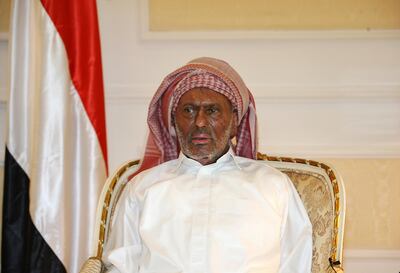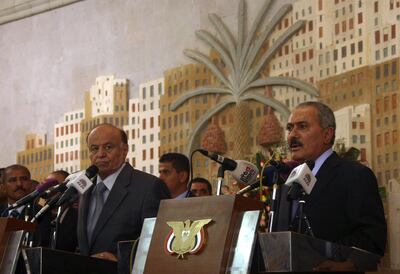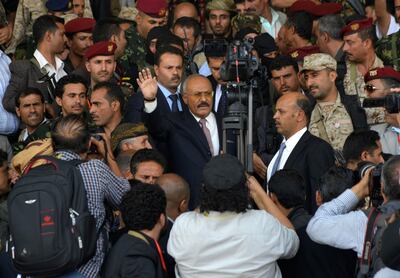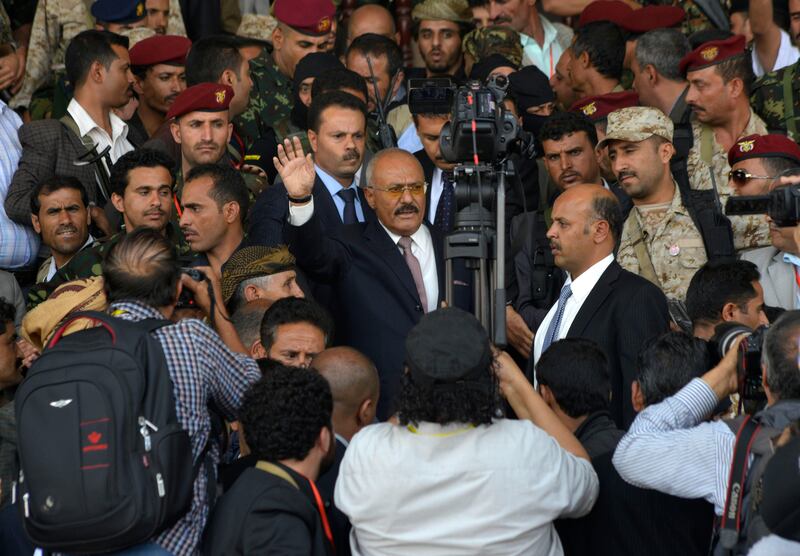Former Yemeni president Ali Abdullah Saleh has made a number of dramatic public appearances since an attack on the presidential palace forced him to flee the country in 2011 — only to return months later. From appearing on television as he recovered from burn injuries suffered in the palace attack to peacefully handing over power to his vice president, Abdrabu Mansur Hadi, Mr Saleh has always tried to make his presence known.
Saleh appears on Yemen TV, bandaged and burnt
In July 2011, Mr Saleh, the then president, was seen publicly for the first time after he was severely injured in a blast at his palace compound a month earlier. He appeared on television with his face burnt and hands covered with bandages.
In a pre-recorded appearance, which aired on Yemen’s state television, Mr Saleh said he had eight operations.
The attack on his palace came after months of unrest and prompted him to flee to Saudi Arabia.
In his Yemen TV appearance, Mr Saleh lashed out at those who wanted to end his nearly 33 years in power, saying they had an “incorrect understanding of democracy”.

Handover of power ceremony in 2012
Yemen’s former president Ali Abdullah Saleh and the country’s new president, Abdrabu Mansur Hadi, appeared together at the presidential palace on February 27, 2012 to cement a power transfer deal.
The ceremony formally ended Mr Saleh’s 33-year reign as president of Yemen. Mr Hadi, who served as Mr Saleh's vice president, was elected to the office of president in a poll where he was the only candidate.
“I would like to congratulate my brother and colleague, His Excellency President Abdrabu Mansur Hadi, for being elected as president of the republic,” Mr Saleh said at the time.
Two years later, Yemen's Shiite Houthi rebels seized the capital, Sanaa, and entered into an alliance with Mr Saleh and his supporters. A Saudi-led coalition, which includes the UAE, intervened in the Yemen war in 2015 to support the internationally-recognised government of Mr Hadi.

Rally marking 35th anniversary of the General People’s Congress party
On August 24, 2017, Mr Saleh appeared at a rally in Sanaa, marking the 35th anniversary of the formation of his General People’s Congress (GPC) party. It came after the Houthis issued a ban on such "partisan" activities amid rising tensions between the allied camps.
Mr Saleh gave a brief speech behind bulletproof glass and surrounded by heavily armed men.
"We are political pioneers with a solid anchor, and we have been facing conspiracies against us since 2011,” he told the crowd, in reference to the start of Arab Spring protests in the capital that eventually led to his resignation.

First public appearance since clashes between Saleh loyalists and Houthis
Mr Saleh attended the funeral of one of his top aides on August 30, 2017, in what was his first public appearance after clashes broke out between his supporters and Houthi rebels in a sign of their alliance’s deterioration.
Colonel Khaled Al Radhi, a high-ranking official in Mr Saleh’s General People’s Congress, was killed along with two rebels in a shoot-out on August 26.
Footage showed Mr Saleh praying over what Yemen Today TV said was the casket of Al Radhi before addressing mourners.
The August 26 clashes came amid rising tensions between the Saleh and Houthi camps, with leaders on each side criticising the other in recent weeks.
The rebels have accused Mr Saleh of trying to pull his forces from the front lines of the war with the government, while the former president’s supporters say the rebels are monopolising power.
TV appearance after reports Houthis are holding Saleh under house arrest
Mr Saleh said on September 4, 2017, that there was no dispute between him and the Houthis, despite reports he was being held under house arrest by the rebels.
“There is no crisis or differences whatsoever, but only in the imagination of those who want these decisions and who want to plant these doubts and divisions,” Mr Saleh said in an interview with Yemen Today TV.





